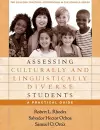
Assessing Culturally and Linguistically Diverse Students
3 authors - Paperback
£42.99
Robert L. Rhodes, PhD, NCSP, is Chair of the Department of Special Education/Communication Disorders at New Mexico State University, as well as a school psychology faculty member. He has experience working in public schools, child and adolescent psychiatric facilities, and an international school setting. Dr. Rhodes has served as President of the New Mexico Association of School Psychologists and state delegate to the National Association of School Psychologists, and is an associate editor of School Psychology Quarterly. His research has focused on intervention strategies for culturally and linguistically diverse students and neuropsychological applications in the schools.
Salvador Hector Ochoa, PhD, is Associate Professor of Educational Psychology at Texas A&M University, where he has a joint appointment in school psychology and special education. Dr. Ochoa serves on various editorial boards of school psychology and special education journals, and is an Associate Editor for the American Educational Research Journal: Teaching, Learning and Human Development. He is a recipient of the Teaching Excellence Award from the Texas A&M Center for Teaching Excellence and the Distinguished Achievement for Teaching Award from the Association of Former Students. His research focuses on bilingual assessment, social status, and educational programming issues of Hispanic children.
Samuel O. Ortiz, PhD, is Associate Professor of Psychology at St. John’s University in Queens, New York. Dr. Ortiz has served as a Visiting Professor and Research Fellow at Nagoya University, Japan, and is currently Vice President for Professional Affairs of American Psychological Association (APA) Division 16 (School Psychology). He was appointed to APA’s Committee on Psychological Testing and Assessment and has published widely on such topics as CHC Cross-Battery Assessment, intelligence testing, nondiscriminatory assessment, cultural and linguistic issues in psychology, and learning disabilities.